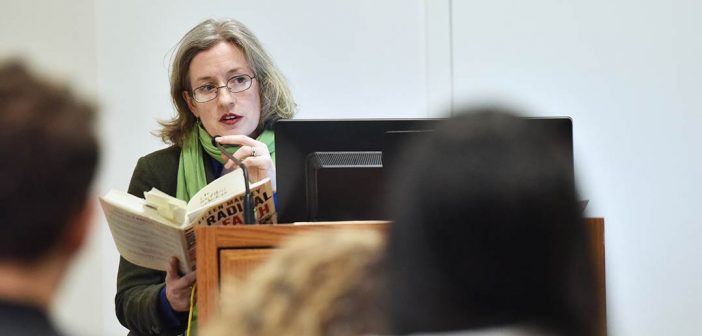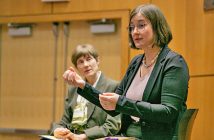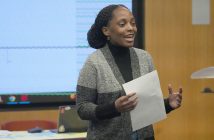The deaths of Maura Clarke, M.M., Ita Ford, M.M., Dorothy Kazel, O.S.U., and Jean Donovan spurred outrage against the U.S. government’s support of the right-wing Salvadoran dictatorship and its campaign of terror against anyone who resisted it.
Five years ago, at the prompting of Clarke’s family, investigative reporter Eileen Markey, FCRH ’98, sought to recover the details of the Sister’s life from the shadow of her horrific death, in a book titled A Radical Faith: The Assassination of Sister Maura (Nation Books, 2016).
On March 7 at the Lincoln Center campus, in honor of International Women’s Day, Markey gave a talk titled “Foremothers Against Tyranny: The Radical Faith of Maura Clarke,” in which she brought Clarke to life as a deeply courageous woman devoted to human rights.
A Way Into the World
According to Markey, for Clarke and many other girls in her insular working-class neighborhood in Rockaway, Queens, joining a religious order was a way into the world—not out of it.
“These girls weren’t running away from anything. Given their class and the gender constraints that they faced, going into the convent was a way to a bigger life,” she said.
After the young woman became a Maryknoll Sister, she spent most of her adult life working with the poor in Nicaragua, and later in El Salvador.
Markey said that ideas raised by the Second Vatican Council of the early 1960s played an important role in Clarke’s deepening commitment to social justice. Special among those ideas were the universal call to holiness, and the emphasis on the church as not just an institution, but of the people themselves.
“By the middle of the sixties, Maura understood the phrase ‘the body of Christ’ to be a description of the people gathered in the pews as much as the wafer in the tabernacle,” said Markey.
A Faith in Which Everybody Matters
According to Markey, Clarke began to live out these ideas in Latin America by working with poor people, especially women, in small groups in their homes—analyzing Bible stories, asking questions about God in their life, and listening to what they had to say.
“I think that’s the radical faith—this idea that everybody matters . . . that nobody is a number, that nobody is a product, that nobody is for sale,” said Markey.
In researching her book, Markey met a number of people whose lives had been touched by Clarke, whose tireless endeavors serving others also included working in schools and health clinics, demonstrating for land reforms, assisting victims of government violence, and documenting human rights abuses.
For Markey, remembering Clarke helps us do more than just understand the conflicts of Latin America in the 1970s.
“There’s something transformational for ourselves when we study a good person, when we understand how her life made sense,” she said.
Markey’s talk was sponsored by the Department of Sociology and Anthropology; Women, Gender, and Sexuality Studies; and Peace and Justice Studies.
–Nina Heidig



